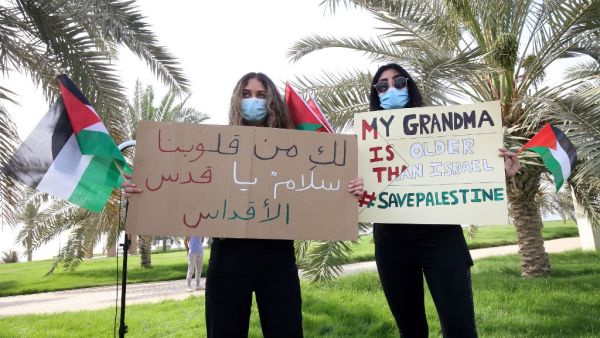Authorities in Kuwait announced on Sunday a ban on unlicensed rallies that could be staged in solidarity with the Palestinian people and against crimes perpetrated by the Israeli occupation forces.
By doing so, the Kuwaiti government seems to be preempting an Islamist exploitation of Palestinian issue. This comes as a number of political forces have already begun making use of the developments in the Palestinian-Israeli conflict for political gains, with some groups using the issue to garner the public’s political support by playing on national and religious feelings.
protest in solidarity with Palestine in Kuwait today. we stand by you, and from the river to the sea, Palestine will be free. #SavePalestine #SaveSheikhJarrah pic.twitter.com/e59UFeXpoN
— lilo with palestine. (@liloandnostitxh) May 11, 2021
The Kuwaiti Ministry of the Interior said on Sunday that “freedom of expression is permissible within the relevant State of Kuwait laws.”
The ministry, however, noted that public demonstrations, such as assemblies to express solidarity with the Palestinian cause, must be legal and require a permit.
“Holding unlicensed public gatherings constitutes a breach of the law, a matter the ministry will not allow at all,” the ministry’s statement published by the official news agency KUNA emphasised.
The ministry also urged citizens and residents to adhere to the relevant laws and public security regulations, affirming legal action will be taken against violators.
With the escalation of violence in the Gaza Strip, the West Bank, Jerusalem and a number of areas within the Green Line, along with the mounting toll from Israeli attacks against Palestinians, calls for solidarity have multiplied in Kuwait, with some groups trying to incite Kuwaitis to take up to the streets.
Measures to confront the coronavirus pandemic have prompted the Kuwaiti authorities to restrict gatherings, determine the number of participants and limit demonstrations to specific sites. However, this is not the only reason for keeping gatherings into check.
Sources familiar with the Kuwaiti issue indicate that there are fears that opposition groups, especially Islamists, will use the Palestinian cause to incite the public against the government. Islamists have done so in the past, the sources said, noting that some groups had exploited the so-called Arab Spring protests to destabilise the country.
In order to prevent Islamists from taking advantage of the Palestinian issue, the government of Sheikh Sabah Al-Khaled Al-Hamad Al-Sabah has issued a statement to support the Palestinians in their plight and condemn the Israeli violence.
Kuwaiti Prime Minister Sheikh Sabah Al-Khaled Al-Hamad Al-Sabah Saturday affirmed that Kuwait has not and will not spare any effort in helping Palestine with everything it can offer.
Sheikh Sabah said during a visit to the Mohammed Al-Ahmad Naval Base that Kuwait’s role is “not only politically to intensify efforts and contacts to support the brothers in Palestine, but rather by doing everything it can offer to ease the burdens on them and we are fully prepared for that and we will spare no effort.”
He added, “We are surprised at the silence of the Security Council, which is supposed to have a role in protecting our Palestinian brothers.”
Sheikh Sabah also noted that efforts are still continuing through contacts and meetings and this constituted a clear message for the Security Council to assume its responsibilities to preserve the lives of the brothers in Palestine.
While some Arab nations accept isr*el,
— rahaf (@RahafsPOV) May 11, 2021
Kuwait stands with Palestine.#FreePalestine
(Photo credit: @/ana.aqaba on Instagram) pic.twitter.com/W3d6VxgTzd
“Unfortunately, during the Eid Al-Fitr holiday, we see what is happening to our brothers in Palestine and what they are subjected to by the Israeli occupation forces in terms of massacres, and we see neighbourhoods that have been bombed and we see children, women and civilians under the rubble, and unfortunately we see the occupation forces walking in their tracks and not paying attention to the international community, and one of our responsibilities in Kuwait is to move with our brothers and friends through the Arab League and the Organisation of Islamic Cooperation and to communicate with influential countries,” he said.
For his part, Kuwait’s Foreign Minister and Minister of State for Cabinet Affairs Sheikh Ahmad Nasser Al-Mohammad Al-Sabah addressed on Sunday a meeting of the UN Security Council, held in New York, renewing Kuwait’s “strong condemnation of the crimes and attacks carried out by the Israeli occupation forces in the occupied Palestinian territories.”
“The State of Kuwait renews its utter denunciation of the crimes and offensives carried out by the Israeli occupation forces in the occupied Palestinian territories, including the city of Jerusalem. Moreover, Kuwait denounces all Israel’s illegal settlement schemes, its bids to seize Palestinians’ houses and properties, particularly citizens’ assets in Jerusalem, namely in Sheikh Jarrah district, seeking to evacuate the holy city of its population for sake of Judaising it,” Sheikh Ahmad said.
“Such practices are illegal and illegitimate breaches and constitute flagrant violation of the relevant international resolutions and references that affirm that unilateral measures and decisions aimed at altering the legal and historic status in the occupied territories are invalid and false; they neither create a right nor a commitment,” the Kuwaiti minister added.
Strong Islamist opposition groups are active in Kuwait. They are constantly trying to use democratic tools provided by the existing political system to impose their visions and ideas towards ensuring the Islamisation of the country, its state institutions and society.
The struggle between the Kuwaiti government and the parliamentary opposition has led to a political paralysis in recent weeks.
The situation could become more complicated if the opposition succeeds in exploiting public sentiments by taking advantage from the recent developments in the region and the ongoing Palestinian-Israeli clashes.
This article has been adapted from its original source.










